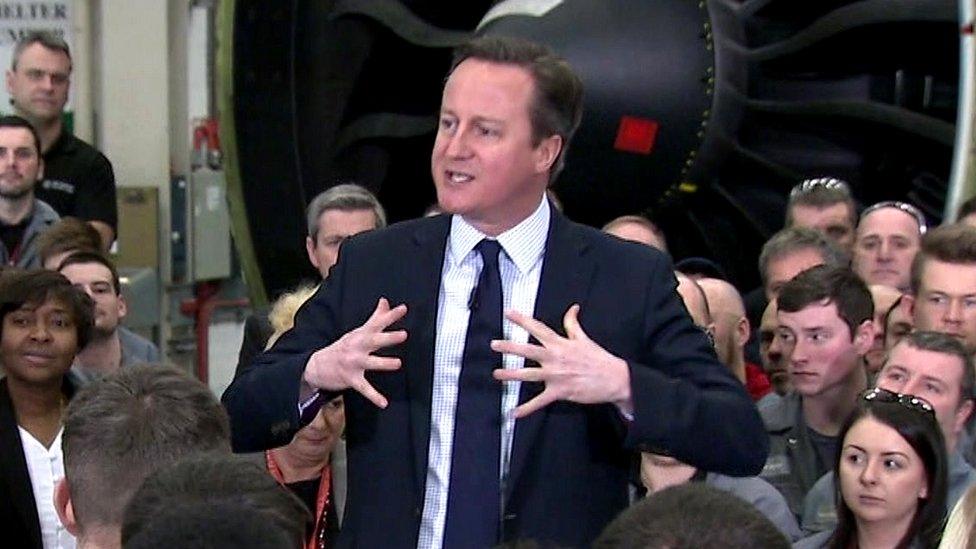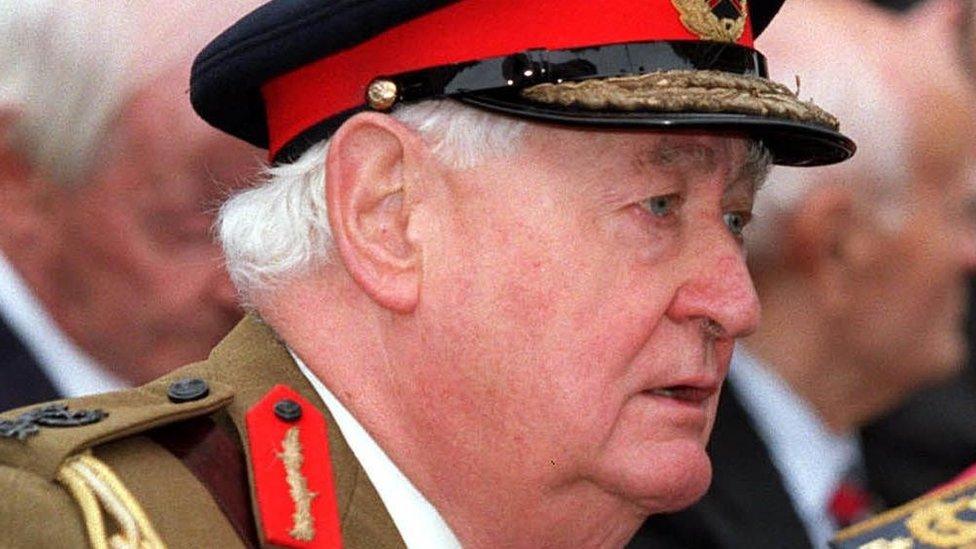David Cameron: No prospect of EU vote re-run
- Published

David Cameron has dismissed claims that EU leaders could be forced to make new concessions to the UK if it voted to leave the EU as a "complete fiction".
Ex-Conservative leader Lord Howard said an Out vote in June could be followed by more talks and another vote to allow the UK to stay on better terms.
But the prime minister said there was no "third way" on the ballot paper.
Speaking in Wales, he said the public faced a "simple and final decision" about whether to stay or leave.
Although not mentioning Lord Howard by name, Mr Cameron told workers during a factory visit in Cardiff that he disagreed with those putting forward the idea of a second referendum, which has also been hinted at by Boris Johnson.
'Sovereign decision'
There were "only two choices" when the UK votes on 23 June, he said.
"I happen to think this idea that there is some third way, as some are suggesting, between in and out...is a complete fiction," he said.
"It is a very simple question on the ballot paper - you either stay in the EU or you leave.
"People really need to understand it is a single decision, it is a final decision."
Mr Cameron said he believed the country would be "better off" if the UK remains in, challenging those who disagreed with him to acknowledge that exiting - a process which could take up to two years - would cause some "economic pain".
He again insisted that he would not quit as prime minister if the UK voted to leave, arguing that the referendum was not about the "future of any politician or political team".
"This is a sovereign decision by the British people...If they vote to leave, I will carry it out."
'Not afraid'
Lord Howard, who led the Tories between 2003 and 2005, when he was a close political ally and mentor of Mr Cameron and Chancellor George Osborne, raised the possibility that EU leaders would have to think again about far-reaching reform in the immediate aftermath of an Out vote.
George Osborne: EU exit 'enormous gamble'
Lord Howard says EU nations "quite likely" to reconsider position if the UK voted to leave
"I think it is quite likely that during that month they would say let's talk some more, let's see if we can reach a different agreement and perhaps you could have a second referendum," he told BBC Radio 4's Today programme.
"If, after a month or so they don't, then Article 50 would have to be triggered and negotiations to leave would begin."
He said he was not afraid of EU exit since, as the world's fifth largest economy, the UK would prosper outside the European Union and, as he put it, "the Germans would still want to carry on selling us their BMWs and the French would still want to carry on selling us their wine".

Analysis by BBC Political Correspondent Ben Wright
After the Maastricht Treaty was rejected by voters in Denmark a batch of concessions were made, a second vote was held and the Treaty passed.
Ireland's initial rejection of the Lisbon Treaty was also followed a second referendum and a different result.
However, these referendums were on fundamental EU treaty change.
Because the EU needs unanimous approval for its primary law to be changed these rejections stalled the whole EU machine and fix had to be found. The UK situation now is different.

He rejected suggestions that negotiating a trade-based relationship with the EU, similar to that which Norway and Switzerland have, would leave the UK with the "worst of all worlds" - with reduced access to the single market but still bound by a lot of EU rules and regulations.
"Norway is a country of five million people. We are a country of 65 million people. We won't have Norwegian-style agreement with the EU, we will have a British style agreement.
"We need a bit of self-belief and national self confidence. We are a great country - everyone wants access to our market. We won't be supplicants."
'Not parlour game'
Meanwhile, Chancellor George Osborne has warned against taking an "enormous economic gamble", claiming that a vote to leave the EU would cause a profound economic shock and it was the "very worst time" for such a move.
Speaking in Shanghai, where he is attending a meeting of G20 finance ministers, Mr Osborne told BBC political editor Laura Kuenssberg that the economy faces more risks of uncertainty than at any point since the financial crisis in 2008.
Mr Osborne said talk of leaving the EU was "not some political parlour game", highlighting the recent fall in the value of the sterling to illustrate his point.
"This is about people's jobs and their livelihoods and their living standards, and in my judgement as chancellor leaving the EU would represent a profound economic shock for our country, for all of us and I'm going to do everything I can to prevent that happening."
- Published30 December 2020

- Published24 February 2016
